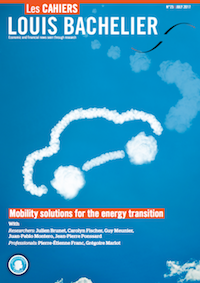The Institut Louis Bachelier dedicated the july issue of its collection “Les Cahiers” to sustainable mobility. Realised with Jean-Pierre Ponssard, co-director of the Chair Energy and Prosperity, this publication deals with various subjects : how driving restrictions affect urban pollution, carbon footprint of motor vehicles in the United States, hydrogen vehicles, the importance of strong regulation to reap the full benefits of innovation in mobility.

Couverture du cahier de l’ILB
Emissions from land transport are not only a major source of greenhouse gas emissions but also cause urban pollution (CO, NOx, SO2, fine particles, etc.) that are directly harmful to health, not to mention problems arising from congestion (loss of time and money, accidents, noise pollution, etc.). To address these environmental and social challenges, various policy initiatives have already been introduced but more drastic measures are still to be implemented, both at national levels and at the level of the major metropolises. Analysis of these policies is a major research topic of the Chair Energy & Prosperity, founded in 2015. The aim is to assess the sectoral and macroeconomic impact of these policies and to identify the institutional regulatory framework most favorable to their funding by the public and private sectors. This issue of Les Cahiers Louis Bachelier provides an overview of the topics covered.
The article by Juan Pablo Montero focuses on short-term measures such as restrictions on the use of vehicles during peak pollution periods, that since 1989 have been in operation in Mexico City, one of the most polluted cities in Latin America, and more recently in Beijing, Berlin and Paris among others.
Carolyn Fischer provides a critical assessment of various policies implemented in the United States, some of them since the late 1970s, either to reduce the carbon content of the fuels used or to improve the energy efficiency of vehicles. Julien Brunet’s article makes an evaluation of a pilot programme currently under way in support of the deployment of hybrid electric and hydrogen vehicles in the Normandy region. In the final piece, Guy Meunier revisits the concept of abatement cost, commonly used to define the optimal date for launching a clean technology, when the costs associated with the technology benefit from strong experience effects, with hydrogen vehicles serving as the empirical basis for illustrating the relevance of his conclusions.
These research papers have been presented in detail at annual workshops organized by the Chair on the topic of sustainable mobility. Supported also by the EDF-Ecole Polytechnique Sustainable Development Chair, these workshops provide an excellent opportunity to organize discussions between researchers and professionals, in particular with the financial partners of these two Chairs.
In this respect I would very much like to thank Pierre Etienne Franc (Air Liquide) and Grégoire Marlot (SNCF) for their participation in the present issue, and more generally their support for this research programme. Thanks also to the researchers, PhD students, Master’s students and the Institut Louis Bachelier for their invaluable contributions to the success and dissemination of our work.
Based on the paper Vintage-specific driving restrictions, by Nano Barahona, Francisco Gallego and Juan-Pablo Montero, and on an interview with Juan-Pablo Montero.
Based on the paper Overlapping Strategies for Reducing Carbon Emissions from the Personal Transportation Sector, by Soren Anderson, Carolyn Fischer and Alex Egorenkov, and on an interview with Carolyn Fischer.
Based on the paper Policies and deployment for Fuel Cell Electric Vehicles an assessment of the Normandy project, by Julien Brunet and Jean-Pierre Ponssard, and on an interview with Julien Brunet.
Based on the paper Defining the Abatement Cost in Presence of Learning-by-doing : Application to the Fuel Cell Electric Vehicle, by Anna Creti, Alena Kotelnikova, Guy Meunier and Jean-Pierre Ponssard, and on an interview with avec Guy Meunier.
Based on an interview with Pierre Etienne Franc, Vice-President Air Liquide advanced Business & Technologies.
Based on an interview with Grégoire Marlot, SNCF’s director of strategy.
Ce workshop s'adresse particulièrement aux chercheurs et chercheuses. En présence de Véronica Salazar (IIE, Stockholm), Anna Papp (MIT), Ludovica Gazze (Warwick), Ondine Berland (LSE), Anouch Missirian (INRAE, TSE), Mathieu Parenti (INRAE, PSE), François Bareille (INRAE, PSAE) et Julien Wolfersberger (AgroParisTech, PSAE).


